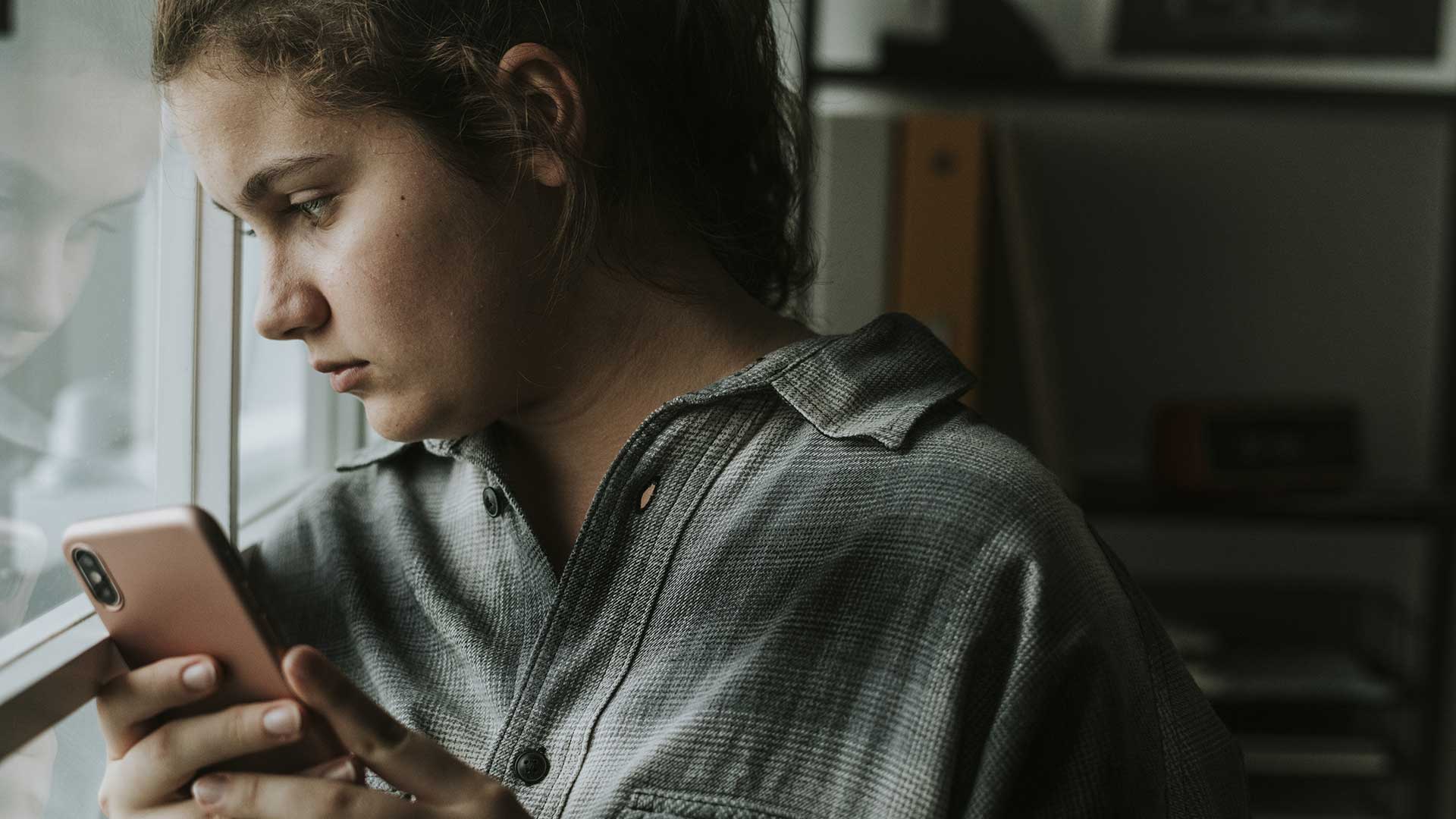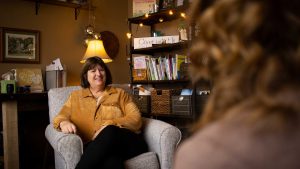
By Laura Melius
“Youth in our diocese, along with those in our country, may struggle with anxiety, depression, time management or being too busy, relationships and comparison,” Mary Weber, MS, LPC, LMFT clinical mental health counselor with The Lourdes Center (formerly Catholic Family Services), has observed.
This news is not surprising. According to the National Institute of Mental Health, an estimated 49.5 percent of adolescents aged 13-18 have experienced a mental health disorder. The causes of this are many, but Mary sees a pattern emerge with the misuse of social media. The immediate feedback it provides comes at a cost to young people.
“The youth have so much coming at them from a social media perspective and the culture of immediate responses, immediate answers and immediate reactions that there isn’t healthy time and space to reflect, pray, cultivate meaningful relationships, as well as lean into values and seek truth over comfort,” Mary says. “Discerning right from wrong and healthy from unhealthy takes time, and often youth feel they do not have the space to pause.”
Teresa Henrickson, LPC-MH, LPC, QMHP clinical director at The Lourdes Center, agrees. “With all of the messages coming at our youth, they can experience an interior pressure to conform to what they see or they may engage in negative self-talk, which may leave them feeling as though they are not enough, or that they don’t have what it takes. The combination of this pressure, overbooked schedules and feeling of immediacy can contribute to symptoms of anxiety and depression.”
Where can adolescents find and practice this essential time to pause?
“I always ask teens, ‘Who are two to five healthy people in your life that you have meaningful relationships with?’” Mary says. “All of us, especially youth, need people that will speak truth to them in a respectful and caring way.”
Adults can, in turn, help this communication by practicing helpful habits in listening and responding.
“Actively listen,” Teresa suggests. “Don’t problem solve within the first sentence; try to not immediately protect the person from what they are experiencing (unless safety is a concern). Instead, listen and then listen some more. Communicate with the person what you heard and understood. Lastly, ask if they would like suggestions or if they just wanted a listening ear. Healing can come when a person experiences being seen and heard.”
Healthy relationships and guidance can also be sought within parish life.
“I like to ask them if they feel connected to their church and what other ways help them feel closer to God so that they can hear his word,” Mary says.
This connection to one’s faith can look different for everyone. Mary has seen that some youth prefer attending youth group events, while others prefer having conversations with their peers or priests.
“I think when their Catholic faith can be their foundation, it helps put daily challenges into perspective. It doesn’t make the challenges go away, but they learn to respond to them in a healthy manner,” Mary explains. “Oftentimes, being reminded of what God wants for them and sees in them, versus some of the man-made challenges they are facing, can bring them clarity, comfort, hope, perspective and reassurance.”
When looking to parish life, communication with God in prayer is a habit that cannot be overlooked when seeking to make healthy decisions.
“Prayer is a pause, and one of the most magnificent gifts given to us by God,” Teresa says. “It requires a commitment on our part to build in space for prayer in our daily lives. Habit is developed by practicing it.”
Mary agrees. “Prayer is essential and integral on our faith journey, so creating space and encouragement, as well as having adults who model this themselves, is important.”
If a family would like assistance in navigating a mental health concern, nurturing relationships, or addressing other concerns, The Lourdes Center provides a welcoming place to help achieve those goals. A typical first session will be spent getting to know the person or family seeking counsel, what problems they are facing and what goals they would like to achieve. The ultimate goal of therapy is for the person seeking counseling to learn skills and find ways to solve their own problems. It is also to achieve wholeness and human flourishing and empower individuals to live integrated lives.
“It is an opportunity for an individual to unpack and make sense of their story, grow in their human understanding, and self-knowledge,” Teresa explains. “Counseling provides an opportunity for individuals to do work around areas of their life where healing is needed. The presenting concern may be any combination of need: grief, trauma, hurting relationships, depression, anxiety, etc. Clinical counselors use their expertise to accompany individuals in their work of human growth and flourishing. Much of the work in counseling takes place outside of the counseling session as individuals integrate the work done in session into their daily life.”

Seeking professional counseling services should never be interpreted as a lack of faith, Mary emphasizes. “People can have faith and mental health challenges, just like people can have faith and physical illnesses, so I hope each person knows it is not a sign of weakness, but instead strength, to seek professional help if needed.”
Both women are encouraged by what they have witnessed by working with the young people in our diocese.
“I think we have AMAZING youth in our diocese, and I am excited about their energy and faith,” Mary says. “I would encourage each to keep fanning the flames of their faith so it keeps growing.”
By modeling healthy communication habits and living our faith, adults of our diocese can continue to provide support to our young people as they face difficulty and seek to grow in faith.
“I would encourage any youth to go to trusted members of the Catholic community to ask their questions, share their struggles, explore answers and seek hope,” Mary says.
Teresa concludes, “Our youth are a gift and they have been chosen by God to exist in the world. Their value is inherent to being born as a child of God through their baptism and not anything that they do or have done. They are a gift to their family, community, parish and diocese. Experiencing depression, anxiety, or another mental health struggle does not diminish that gift.”


